League Of Olympic Swim Legends: Ian Thorpe Tops 400 Free Podium With Rose & Salnikov
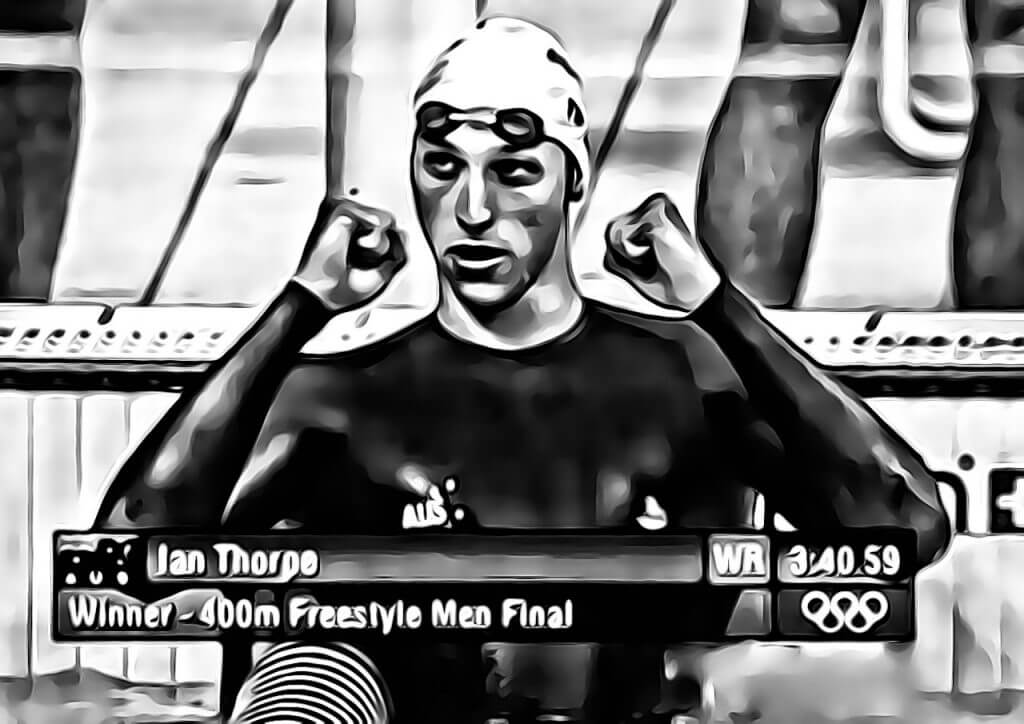
What do you think would have unfolded had Tokyo 2020 gone ahead as planned this week – and where would all of that fit in with Olympic swim legends of yesteryear, like … Ian Thorpe, Murray Rose and Vladimir Salnikov…?
To mark the eight days over which the Tokyo 2020 Olympic Games would have unfolded had the coronavirus pandemic not forced postponement, the team at Swimming World is filling the void with a Virtual Vision Form Guide and League of Olympic Swimming Legends.
Tokyo Vision: Mack Horton Looks to Go Back-to-Back in 400 Freestyle
Day 1, event 2 … Make way for the Thunder from Down Under.
Men’s 400m freestyle
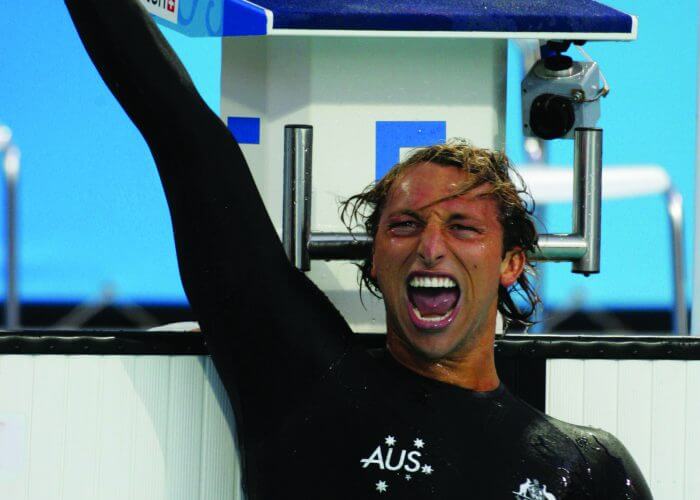
Ian Thorpe Athens 2004 – Photo Courtesy: David Gray
The Podium
- Ian Thorpe (AUS)
- Murray Rose (AUS)
- Vladimir Salnikov (URS)
The Other Finalists (Listed Alphabetically):
- Brad Cooper (AUS)
- Brian Goodell (USA
- Norman Ross (USA)
- Don Schollander (USA)
- Johnny Weissmuller
- and in Lane 9* to recognise the result and the mistake of blazers where the price was paid by the athlete:
- Rick Demont (USA)
* – in our series, we will use Lane 9 to add an athlete whose story reflects extraordinary situations of different kinds
All-Time Battle Of Olympic Swim Legends Goes To Ian Thorpe
The Australian flag was flying high at the conclusion of the 400 freestyle, as Ian Thorpe and Murray Rose supplied a gold-silver finish for the Land Down Under. It was a fitting result, given Thorpe (2000/2004) and Rose (1956/1960) are the only two men in history to repeat as gold medalists in the event. Ultimately, Thorpe and his five world records and his ahead-of-his-time performances swayed the all-time title in his favor.
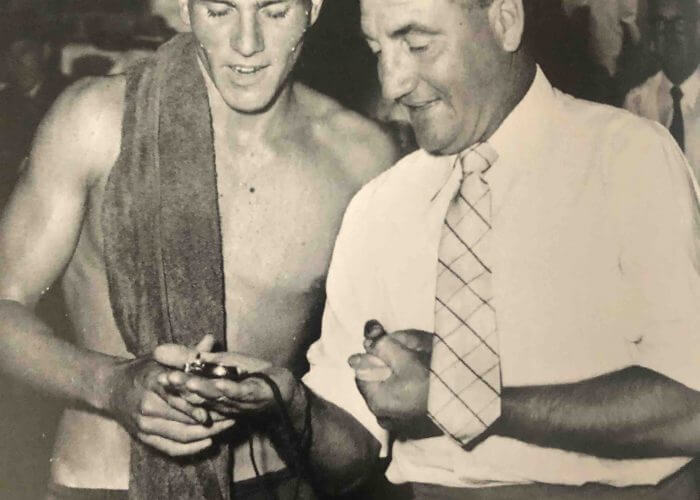
Murray Rose and his coach Sam Herford – Photo Courtesy: ISHOF
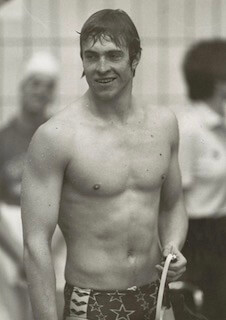
Vladimir Salnikov in 1983 – Photo Courtesy: Ladislav Perenyi / Swimming World Archive
Thorpe was a 17-year-old phenom when he claimed his first Olympic crown in 2000. Already a world champion two years earlier, Thorpe delighted the home crowd in Sydney with a dominant showing. Four years later, he had a tougher go when countryman Grant Hackett pushed him to the wall in Athens. As for Rose, each of his golds were three-second triumphs over Japan’s Tsuyoshi Yamanaka.
The legends bronze medal went to the Soviet Union’s Vladimir Salnikov, the 1980 Olympic champion. The boycott of the Moscow Games by the United States robbed the opportunity of a showdown between Salnikov and Brian Goodell in the 400 free and 1500 free. It was Goodell who finished just off the podium in the Legends race. Salnikov, with five World records and the holder of the standard between 1979 and 1985, had the edge.
The final of the 400 freestyle featured an unconventional nine swimmers, as American Rick DeMont was granted inclusion in Lane Nine. The original victor in the event at the 1972 Olympics, DeMont was disqualified after a positive doping test that was by no fault of his own. Having listed his asthma medication on official documents, United States officials failed to notify the proper authorities of DeMont’s situation.
Olympic Swim Legends – Our Winner’s Winning Ways:
Ian Thorpe’s First Olympic Gold – In World-Record Time
2000 Sydney – Men 400m Freestyle – Athletes: 46 Nations: 40
- 3:40.59wr Ian Thorpe AUS
- 3:43.40 Massimiliano Rosolino ITA
- 3:47.00 Klete Keller USA
3:47.01 Emiliano Brembilla ITA
3:47.38 Dragos Coman ROM
3:47.58 Chad Carvin USA
3:48.22 Grant Hackett AUS
3:48.52 Ryk Neethling RSA
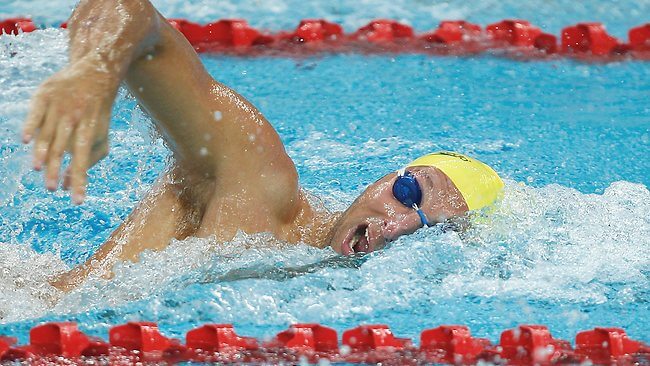
Ian Thorpe – Photo Courtesy: Swimming World Archive
Undefeated over 400m freestyle in a long-course pool between 1998 and his retirement in 2006, Ian James Thorpe (AUS), AKA the Thorpedo, rocketed past myriad milestones on a stellar trajectory to 18 world records, five Olympic gold among nine medals and 11 World Championship gold medals.
A black bodysuit and vast fountains that spilled from the fastest feet in water were among iconic hallmarks of a success story that held the public’s gaze beyond the pool, raised the profile of swimming and made the man a relative swimmer’s mint as the era of big-money incentives for swimmers gained momentum.
If the 3:40.08 World record set by Ian Thorpe over 400m freestyle in 2002 survived at the dawn of 2008 as witness to his generation-skipping excellence, then the first evening of finals at Sydney 2000 will long live in memory as one of the most thrilling in Olympic history.
It started with Thorpe, coached by Doug Frost in Sydney, crushing the field in the 400m with a world record of 3:40.59 off splits of 52.64, 1:48.86 and 3:12.88 at each passing 100m. The execution of that performance was thrilling to behold, the end result moulded by a combination of talent, hard work and a mind more mature than the swimmerís years. A much-improved Massimiliano Rosolino (ITA) swam in the gap between Thorpe and the best of the pack some seven seconds behind the champion. Drawing on Thorpe, the Italian set a European record of 3:43.40, the bronze going to Klete Keller (USA) on 3:47.00, locking out Rosolino’s teammate Emiliano Brembilla by 0.01sec.
After winning the 400m crown by the biggest margin since Murray Rose (AUS) in 1960 (see below), Thorpe entered the water as the last Dolphin in the 4x100m freestyle, was overtaken by American Gary Hall Jr to the turn but fired back on all cylinders on the way home and got to the touchpad a hand ahead of the USA, which lost the sprint freestyle relay for the first time since 1964.
The Dolphins celebrated by playing air guitar on the deck to remind Hall of his pre-Games gibe that the USA quartet would smash the Aussies like guitars.
Ian Thorpe took up swimming aged 5 and entered the Australian consciousness when he won five titles at national youth championships in 1996. Coached by Frost from teenager to the fastest middle-distance freestyler ever seen, Thorpe was the youngest Australia team member ever, when, at 14 years and 5 months, he finished second in the 400m freestyle at the 1997 Pan Pacific Championships in Fukuoka. He would never know defeat in a long-course 400m again.
In 1998 at Perth World titles, he became the youngest male world champion ever, winning the 400m crown in 3:46.29, aged 15 years and three months. His second gold marked the first non-American 4x200m victory in World Championship history.
Later that year, the relay claimed the Commonwealth title in Kuala Lumpur in 7:11.86 and on August 22, 1999, at the Pan Pacific Championships in Sydney, Ian Thorpe’s stature soared when he clocked 3:41.83 over 400m to break the 1994 world long-course record of Kieren Perkins (AUS) by 1.97sec, the biggest advance since 1969. The next day, Thorpe took the 200m world record (1:46.34) away from Hackett in the semi-final and won the final in 1:46.00.
He warmed up for Sydney 2000 by breaking the 200m world record twice and the 400m once at the Olympic trials. After a stunning opening day at the Games proper, he lost the 200m world record and had to settle for silver behind Pieter van den Hoogenband (NED) but celebrated gold in the 4x200m freestyle and silver in the medley relay for a five-medal tally. The follow-up was even better: if six gold medals at the 2001 World Championships in Fukuoka set a record in itself, then the global marks he established over 200m (1:44.06), 400m (3:40.17), 800m (7:39.16), and as a member of the 4x200m freestyle relay (7:04.66) were monumental. He raced faster in the 400m just once more, in 3:40.08, to win one of a record six Commonwealth titles in Manchester, 2002.
Ian Thorpe’s Golden Olympic debut:
And the encore – Athens 2004:
Another Great 400m Freestyle Race In History
When Murray Rose retained the Crown by the same margin of victory over Tsuyoshi Yamanaka as he had in 1956
1960 Rome – Men 400m Freestyle: Athletes: 40 Nations: 25
- 4:18.30OR Murray Rose AUS
- 4:21.4 Tsuyoshi Yamanaka JPN
- 4:21.8 John Konrads AUS
4:21.8 Ian Black GBR
4:22.0 Alan Somers USA
4:26.3 Murray McLachlan RSA
4:26.8 Eugene Lenz USA
4:29.6 Makoto Fukui JPN
Date of final: August 31, 1960
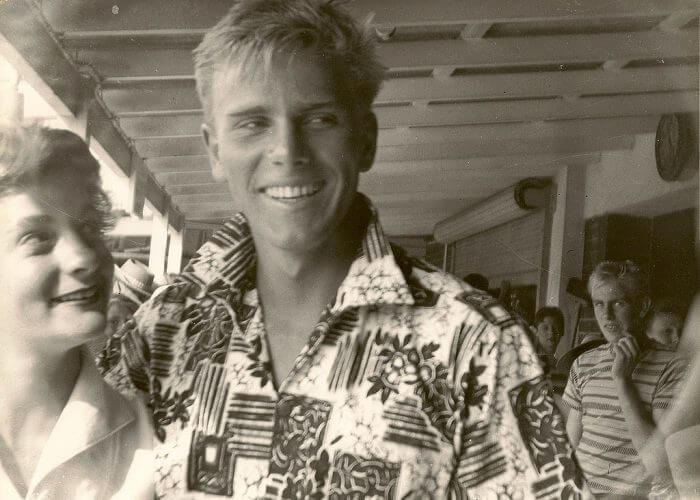
Murrary Rose – Photo Courtesy: peta.org
At a home Games in Melbourne in 1956, 17-year-old Murray Rose had become the youngest winner of three gold medals (400m, 1500m and 4x200m freestyle) and the first swimmer since Norman Ross (USA) in 1920 to win both distance freestyle crowns.
No longer a teenager, Rose made history again at the 1960 Games in Rome when he became the first man ever to retain the 400m title. He did so by precisely the same winning margin, 3.1sec, ahead of precisely the same opponent, University of California teammate, Tsuyoshi Yamanaka (JPN), this time not at home but in the waters of the beautiful Stadio del Nuoto at the heart of the Foro Italico.
In the heats, Yamanaka, on 4:21.0, was one of five men to race inside Rose’s Olympic record from 1956, with Alan Somers (USA), on 4:19.2 entering the final in lane four well ahead of Rose (4:22.5) and young teammate John Konrads.
In the final, Rose, yet again, won the battle of tactics. Over the first 100m, he let Sommers (1:00.0) Yamanaka (1:00.3) and Konrads (1:00.6) set the early pace, turning in 1:01.3. By 200m, Somers maintained the lead in 2:06.8, 0.2 ahead of Konrads, with Yamanaka on 2:07.1 and Rose back in touch on 2:07.2. At this stage Ian Black (GBR) was back on 2:09.1.
Rose attacked straight out of his half-way turn, opening up a 2sec lead over the next 100m, his 3:12.2 followed by Konrads and Somers on 3:14.1 and Yamanaka on 3:14.3, while Black was back on 3:16.0. The champion retained the crown in 4:18.3, with Yamanaka winning the fight for silver in 4:21.4, 0.4sec ahead of Konrads, while Black passed Somers at 350m and fell a stroke shy of making the podium: his time matched that of Konrads but in the days of human-eye judgments, the Australian was given the benefit of any doubt that there might have been.
Between Athens 1896 and Athens 2004, no man was able to win an Olympic crown in the pool at three successive Games, and if Johnny Weissmuller stopped Duke Kahanamoku in 1924 before an underwear contract and the call of Tarzan stopped Weissmuller himself in 1932, then the next nearly man was Iain Murray Rose, with bureaucracy the barrier to his tantalising tilt at the triple. Having won the 400m in 1956 and 1960 and taken gold and silver in the 1,500m at those same Games, Rose proved his winning form in 1964 with a world record of 17:01.8 at the US championships on August 2. However, that failed to sway selectors after Rose had opted not to travel home from America for trials. He retired without racing at a third Games.
Black, of Inverness, later became headmaster of Robert Gordon’s College in Aberdeen and was top teacher there when one of the pupils was a Neil Cochran, coached to national-champion status by Wally Lord, the father of Swimming World‘s Editor before he attended college in the United States: at Los Angeles 1984, Cochran claimed two bronze medals, one over 200m medley, the other as a member of the Britain 4x2100m freestyle quartet.




I think you forgot about Peter Szmidt who held the world record from 1980-1985.
We didn’t forget Peter: his story is mentioned here: https://www.swimmingworldmagazine.com/news/memories-of-moscow-1980-40-years-since-a-day-of-ddr-sweeps-a-double-for-salnikov-at-a-time-of-boycott-doping/
A terrible outcome, among many stories of opportunities lost through no fault of the athlete.
In the League series, Peter doesn’t have enough points to make the legends line-up, even if we gave him the 1980 gold, he would lag all the others on points. Best, C